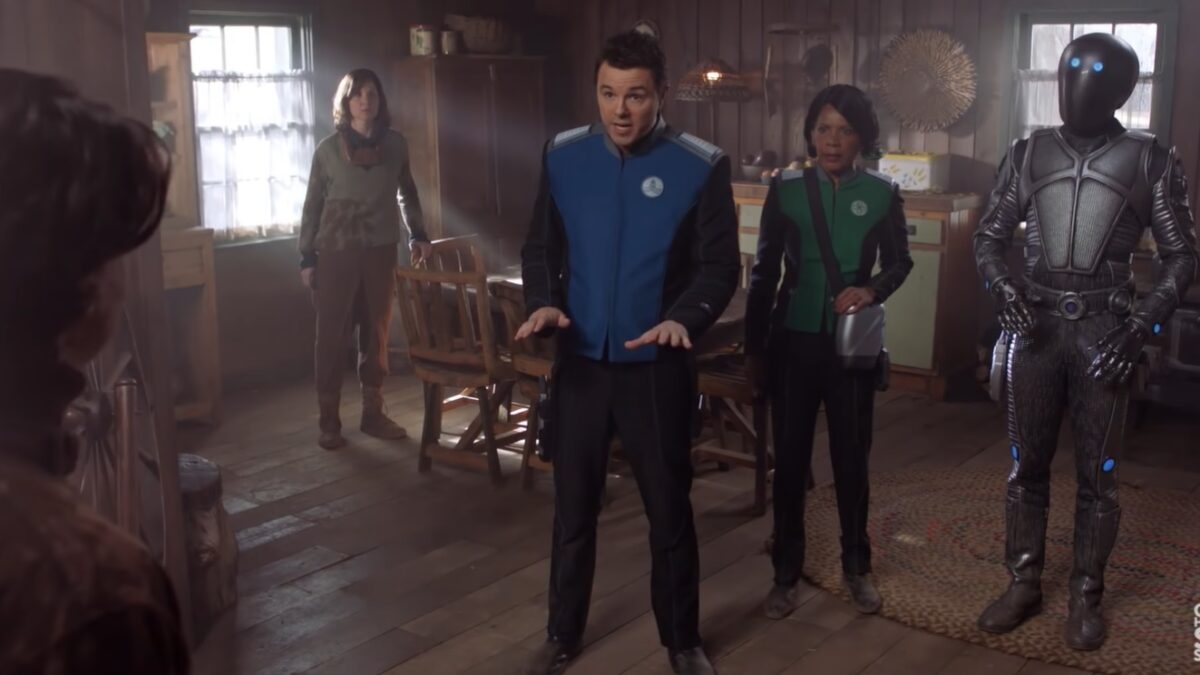When the first two seasons of “The Orville” aired in 2017 and 2018, the show brought a feeling of familiarity and freshness. It felt familiar because it adopted the patterns of previous great sci-fi shows, mainly “Star Trek: The Next Generation,” employing an episodic structure, exploring deeper philosophical issues, and presenting a progressive utopia where liberal values and space-age technology have perfected human society.
Ironically, “The Orville” felt fresh for the same reasons it felt familiar. With sci-fi television shows like “Battlestar Galactica,” “The Expanse,” and even some of the later “Star Trek” series adapting to streaming by taking a grittier tone, projecting a much darker dystopian future, and featuring season-long plot and character arcs, the lighthearted cheeriness of “The Orville” was a welcome change. Moreover, it had comedian Seth MacFarlane at the helm, allowing the audience to look forward to a little more humor and little less nerdiness.
That said, the show had some serious flaws that likely led to it not being renewed after its second season ended in 2019. Most of those flaws arose from MacFarlane struggling to pick a lane: lightheaded and funny or heavy and thoughtful? When it was the former, there were hilarious moments like Isaac the sentient android acting like a deadbeat boyfriend or the toxic masculine alien Bortus endangering his ship with his gay porn addiction that brings on a computer virus. When it was the latter, the viewer was subjected to cringe-inducing speeches about the dignity of women or tedious soul-searching from dull millennial alien Alara Kitan.
When Hulu renewed “The Orville” for a third season, entitled “New Horizons,” this year, it seemed like MacFarlane would finally pick a lane: he would ditch the comedy and attempt to go serious and deep. Sadly, this decision, though consistent, ends up robbing the show of all its redeeming qualities. Now there would be more moralizing, more sanctimony, and much more boredom.
Sanctimonious Not Deep
This might come off as a surprise, considering that the show takes on hot-button issues like transgenderism, survivor’s guilt, immortality, populist fascism, realpolitik, and reckoning with slavery. But so much of what goes wrong in “New Horizons” stems from MacFarlane’s own limits. He’s not a deep thinker and his atheist-leftist prejudices often filter into the writing. He treats each of these issues superficially, with one side clearly right (the woke progressive Planetary Union) and the other side clearly wrong (the religious fundamentalist Krill, the misogynist Moclans, the unfeeling Kaylon, or overly nostalgic human beings).
Some of the shallowness could be mitigated with some humor and humility — and in the previous two seasons, it was — but instead of jokes, MacFarlane and the other writers plug in more speeches. Each of the main characters seems to take their turn as the episode’s woke scold, lecturing others on being more tolerant, more progressive, and more compliant with the system. To make things more frustrating, none of these characters have to compromise their positions to accommodate any messy realities. Rather conveniently, they can invent a time machine, build a magic weapon, or simply be rewarded for breaking protocol, and all is well again.
Bad Performances
The writing alone doesn’t sink “New Horizons.” The performances are similarly bad. None of the actors or actresses have the nuance or depth to offset the ponderous, clunky script. When the show was more comedic and the actors were a little younger, there was less pressure on anyone to do much more than play their role as the goofy pilot, or the tone-deaf alien, or the beleaguered man-child captain. However, the constant foisting of existential and moral conflict into each and every episode makes it painfully obvious that the cast can’t shoulder the burden.
Moreover, it’s not just the overly serious tone that changes for the worse, but the structure of show changes as well in “New Horizons.” Despite having more money, more time, and better special effects, less seems to happen. “The Orville” goes from being an exploratory spaceship discovering “strange new worlds” and seeking “new life and new civilizations” to being a diplomatic/military vessel that negotiates ongoing tensions between developed species. As such, the season gradually dispenses with the episodic structure and ties episodes together with longer plot and character arcs. However, because this evolution is more accidental than planned, many of the advantages of such a structure (e.g., more well-rounded characters, complex storylines, higher-stakes cliffhangers) aren’t ever realized.
Thus, what starts off as a loving parody of and homage to “Star Trek: TNG” in the first two seasons degenerates into a cheap imitation. “The Orville: New Horizons” is just “Star Trek: TNG” with worse writing, worse acting, and less action. If anything, it actually highlights just how good the writing and acting was back on “Star Trek: TNG,” something even a die-hard trekkie like MacFarlane doesn’t fully appreciate. One can’t simply reproduce that same show for today, but must adjust to the times, make some important changes, and become something altogether new. “The Orville” seemed primed to do that, but sadly blows that opportunity in its last season by neglecting the basics of storytelling and forgetting to laugh at itself.









